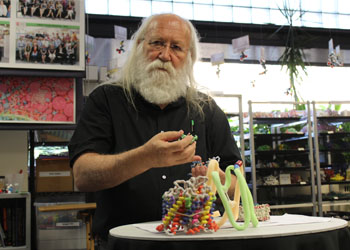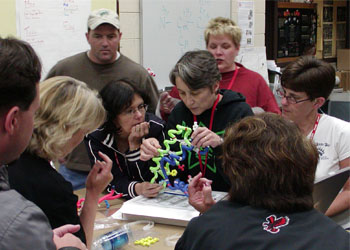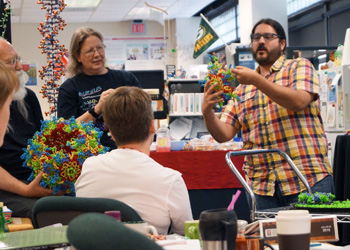Molecular World
Modeling the Molecular World
Returning Summer of 2023!
The course has been put on hiatus until 2023
Check back in fall of 2022 for summer 2023 course dates!
Course Description
Modeling the Molecular World focuses on connecting the macroscopic world in which students live with the invisible world of molecules. As noted in the Next Generation Science Standards, modeling is both an authentic practice of science and an essential tool in the classroom. Our approach to teaching the molecular biosciences is based on the use of physical models of proteins and other molecular structures to engage students in an active exploration of the topic. We use models of all sorts in this workshop – from magnetic water molecules and mini-toober models of proteins to schematic models of membranes and components of the flow of genetic information (DNA → RNA → proteins). We will also model a variety of different teaching strategies as "pedagogical moments" interspersed throughout the course.
This workshop introduces a teaching strategy that combines the "big ideas of chemistry and biology" with cutting edge molecular stories of current research. We begin with the definition of a protein as a linear sequence of amino acids that spontaneously folds up into a complex 3D shape following basic principles of chemistry. We then explore these principles of chemistry using a magnetic water kit, and transfer them to the twenty amino acid sidechains. After folding a mini-toober model of a protein into a complex 3D shape, students are ready to examine real proteins, either as computer-generated interactive images, or as physical models. As a final step in this approach, we illustrate the application of these basic principles of chemistry to real proteins that are involved in stories of current research.
Teachers accepted into this program will:
- Equip their classrooms with a collection of innovative instructional materials including….. Water Kits, protein and DNA models, posters and cellular landscapes by David Goodsell.
- Learn how to use Jmol, a molecular visualization program, to design physical models of proteins that can be built using 3D printing technology.
- Be prepared to coach Science Olympiad Protein Modeling teams, lead a MAPS Team (Modeling A Protein Story) or organize a SMART Team (Students Modeling A Research Topic) in their school.
Following their participation in this Modeling the Molecular World workshop, teachers will be well prepared to attend other more advanced workshops focused on specific topics in the molecular biosciences, including The Science and Ethics of Genome Editing.
The course has been put on hiatus until 2023
Check back in fall of 2022 for summer 2023 course dates!
Application Information
A $750 workshop fee covers the cost of:
- Workshop materials – including protein models and instructional materials to take back to your classroom
- Most importantly - a lifetime membership in a community of professional educators who share a passion for introducing their students to the amazing molecular world.
A limited number of scholarships are available for those with identified need. Applications for scholarships are available on request. Contact Tim Herman at tim.herman@3dmoleculardesigns.com for more information.
The course has been put on hiatus until 2023
Check back in fall of 2022 for summer 2023 course dates!
A Community of Professional Educators
Teachers in this program will be encouraged to become active participants in a professional community of educators - committed to documenting the impact of their classroom innovations on student learning, and to sharing the results of that education research with others.

What teachers are saying about Modeling the Molecular World. . .
I already had some of these models, but I did not use them to their full potential before I got this training.
It was an amazing workshop. Foundational pieces of biology are woven through these stories.
Models give the students an opportunity to discover on their own, rather than having you tell it to them.
The kinds of topics that we studied in this workshop are really some of the biologically significant issues that should be included and emphasized in courses.
These curriculum modules tie what seems like a really abstract idea--some little change in a molecule you can’t even see—to their own health. That’s really compelling. This stuff isn’t in any textbook.
The fact that they were so teacher-focused was refreshing.
The CBM staff let us be learners, and they respected us.
Our instructors were a really good blend of challenge, respect and fostering.
I really appreciated that they didn’t try to tell us how to teach. They let us be learners, and from being learners we learn how to teach.
Coming to this workshop, I have a much greater understanding of things . . . to actually see Tim explain it . . . He’s really good at saying "Why does this happen?" and then someone in the group has the answer. That’s what I want my students to be able to do.
Watching the CBM staff, who are masters, and being given these models is wonderful. None of us could have budgeted for this. Now we have powerful knowledge and powerful examples that we can put in our kids’ heads. I’m so excited for the school year to start, I don’t want to have to wait two months!
I loved that they modeled the activities for us and put us in the shoes of our students. …. It reinforced some conceptual things for me so I thought it was awesome.
Tim Herman made me a better scientist in five days in a way that no other mentor ever has. If I can figure out how to inspire the level of deep thought that Tim does, the way he tells his stories quietly and compellingly, asking "Hmmm . . . I don’t know?" questions . . . That’s what a good scientist does. Tim allowed us to wonder.
















